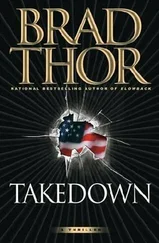Brad Thor - Full Black
Здесь есть возможность читать онлайн «Brad Thor - Full Black» весь текст электронной книги совершенно бесплатно (целиком полную версию без сокращений). В некоторых случаях можно слушать аудио, скачать через торрент в формате fb2 и присутствует краткое содержание. Жанр: Триллер, на английском языке. Описание произведения, (предисловие) а так же отзывы посетителей доступны на портале библиотеки ЛибКат.
- Название:Full Black
- Автор:
- Жанр:
- Год:неизвестен
- ISBN:нет данных
- Рейтинг книги:5 / 5. Голосов: 1
-
Избранное:Добавить в избранное
- Отзывы:
-
Ваша оценка:
- 100
- 1
- 2
- 3
- 4
- 5
Full Black: краткое содержание, описание и аннотация
Предлагаем к чтению аннотацию, описание, краткое содержание или предисловие (зависит от того, что написал сам автор книги «Full Black»). Если вы не нашли необходимую информацию о книге — напишите в комментариях, мы постараемся отыскать её.
Full Black — читать онлайн бесплатно полную книгу (весь текст) целиком
Ниже представлен текст книги, разбитый по страницам. Система сохранения места последней прочитанной страницы, позволяет с удобством читать онлайн бесплатно книгу «Full Black», без необходимости каждый раз заново искать на чём Вы остановились. Поставьте закладку, и сможете в любой момент перейти на страницу, на которой закончили чтение.
Интервал:
Закладка:
“PROMIS would then focus on these people and pull up all of their records, searching for any criminal history, mentions of them in previous investigations, and any and all hints of a conspiracy that might exist between you two and what it might entail. It was like the Terminator. It never slept. It never stopped. And the U.S. was all too happy to share this software with its allied intelligence partners.
“I say all too happy, because the U.S. had built a backdoor into the system. This door allowed the U.S. to monitor everything the other intelligence agencies were doing with the program and provided Uncle Sam with the same data that foreign intelligence agencies were accumulating.
“Interestingly enough, the Israelis-who conduct relentless espionage against their supposed ally and benefactor, the United States-had also been able to build a trapdoor into the system before America offered it to its intelligence partners. The trapdoor provided the Mossad with a treasure trove of information on Jordanian intelligence operations, in particular their vast dossiers on problematic Palestinians.
“Copies of PROMIS wound up on the black market, and intelligence agencies and governments around the world began using it to track and kill dissidents. The system was incredibly effective and became known as the perfect killing machine.
“PROMIS could tell an intelligence officer or a military commander that a certain dissident had been spotted in a particular part of the country and had taken a bus or train to another location where the dissident spent the night at a particular person’s house. It didn’t matter if that person traveled under a false name or not; age, height, hair, eye color, and any other distinguishing features could be fed into PROMIS and it would search until it found the person. It succeeded in getting tens of thousands of dissidents killed around the globe.
“In fact, there’s an infamous story about an impending miners’ strike in South Africa back in the apartheid days. PROMIS helped track down the instigators, all of whom then ‘disappeared.’ The strike never took place.
“It is easily one of the most incredible and most incredibly dangerous pieces of software ever constructed. At least it was.
“When the Finns discovered the trapdoors in PROMIS, they realized they needed their own system, not one provided by a foreign government with potentially ulterior motives. That’s when they started working on TIP and took the process to an entirely new level.
“They kept all the features of PROMIS and then, via true artificial intelligence, went supernova by giving it a fully functioning brain. TIP not only can think, it can anticipate. The U.S. is going crazy trying to catch up. That’s one of the reasons NSA has partnered with Google. And if you think TIP is scary, wait’ll you see what Google is building with all they’re learning about human behavior from the millions of Google search queries logged on their system every day.”
Harvath didn’t doubt it. And while he appreciated any edge he could get in the fight against America’s enemies, the damage programs like PROMIS and TIP could wreak in the wrong hands was obvious. “There’s really no such thing as privacy anymore, is there?” he said.
“Not in the United States,” replied Nicholas. “At some point, remind me to explain the Narus technology to you and the electronic driftnet the NSA has strung out across cyberspace. Suffice it to say that every single email, text message, fax, and phone conversation is being recorded and stored. The problem for the NSA is sifting all that data for what they want. It’s like trying to drink from a fire hose. It’s one of the big reasons the terrorists are going low-tech. As the Chinese recognized when assembling their unrestricted warfare plans, the U.S. is overdependent on technology. Outwit that technology and you can flummox the world’s sole superpower.
“That’s what the Finns have done with TIP. The system is so amazing, it has been able to double back on America.”
“How many U.S. intelligence agencies has it compromised?” asked Harvath.
“We don’t know yet,” said Carlton, “but we’ve alerted the appropriate people on our end.”
“Was our group penetrated?”
“Not that we can tell,” said Nicholas. “They seemed more interested in the FBI, CIA, NSA, DIA, and other, more high-profile places.”
“How long have you had access to TIP?”
“Not long enough.”
“Okay, so what’s the connection with this guy Shafik in Albuquerque?” asked Harvath, changing gears. “You ran his name through TIP and you came up with the Egypt Air flight manifest. He arrived in the U.S. with another Egyptian named Mohammed Fahad Nazif. Nazif is the subject of an FBI investigation, correct?”
“Correct.”
“Why is the FBI interested in Nazif?”
Nicholas clicked his mouse and zoomed in on the map. “Three weeks ago, Mohammed Fahad Nazif blew himself up while rigging the support columns of a downtown Chicago office building with military-grade explosives.”
“What?” replied Harvath.
“The building is known as 100 North Riverside Plaza. We believe it was selected as another transportation target because it was built suspended over the Amtrak train tracks.”
“So at least one of the dot colors represents transportation?”
“That’s what we now think.”
“How come we didn’t hear about this?” asked Harvath.
“The FBI used local media to put out a cover story about a gas rupture and a minor explosion,” said Nicholas. “It happened in the business district late on a Sunday evening. No one, other than Nazif, was injured or killed.”
“Even so, we should have been read in.”
Carlton shook his head. “You keep forgetting that you’re in the private sector. The FBI doesn’t have to tell us anything.”
It was true. A decade past 9/11, the FBI and the CIA still barely shared any intelligence. To expect either of them to share with a private organization was crazy. “We’ve got two dead Egyptians, then,” said Harvath. “They both originally came into the country on the same flight fifteen years ago and both attempted to carry out terrorist attacks with explosives a few weeks apart. One succeeded and one didn’t. Does that about sum it up?”
“Almost,” said Nicholas. “They both came into the country on what is known as dual intent visas. One came in on an L-1, the other an H1-B. The exact type of visa isn’t important. What is important is that because it was a dual intent visa, they were allowed to apply for a green card while they were working here. Both requests were granted.”
“Tell me they were both sponsored by the same employer,” said Harvath.
Nicholas shook his head. “Unfortunately, no. They were sponsored by two different companies. What’s interesting, though, is that by accessing the Department of State database, we discovered that both men applied for their visas at the U.S. consular office in Cairo within weeks of each other.”
“Okay,” said Harvath, sensing there was something else.
“After accessing the Immigration and Naturalization Service database, we learned that both men, though living in different parts of the country and working for different companies, used the same law firm to process their green card applications.”
“Dual intent visas with an American sponsor would have meant a lot less scrutiny upon arriving in the United States,” said Harvath.
“It also meant that they could come and go back to their country of origin if they wanted, without raising significant attention. Essentially, they had a corporation standing behind them, vouching for their authenticity. And because of their visas, they were recognized as aliens of extraordinary ability.”
Читать дальшеИнтервал:
Закладка:
Похожие книги на «Full Black»
Представляем Вашему вниманию похожие книги на «Full Black» списком для выбора. Мы отобрали схожую по названию и смыслу литературу в надежде предоставить читателям больше вариантов отыскать новые, интересные, ещё непрочитанные произведения.
Обсуждение, отзывы о книге «Full Black» и просто собственные мнения читателей. Оставьте ваши комментарии, напишите, что Вы думаете о произведении, его смысле или главных героях. Укажите что конкретно понравилось, а что нет, и почему Вы так считаете.












